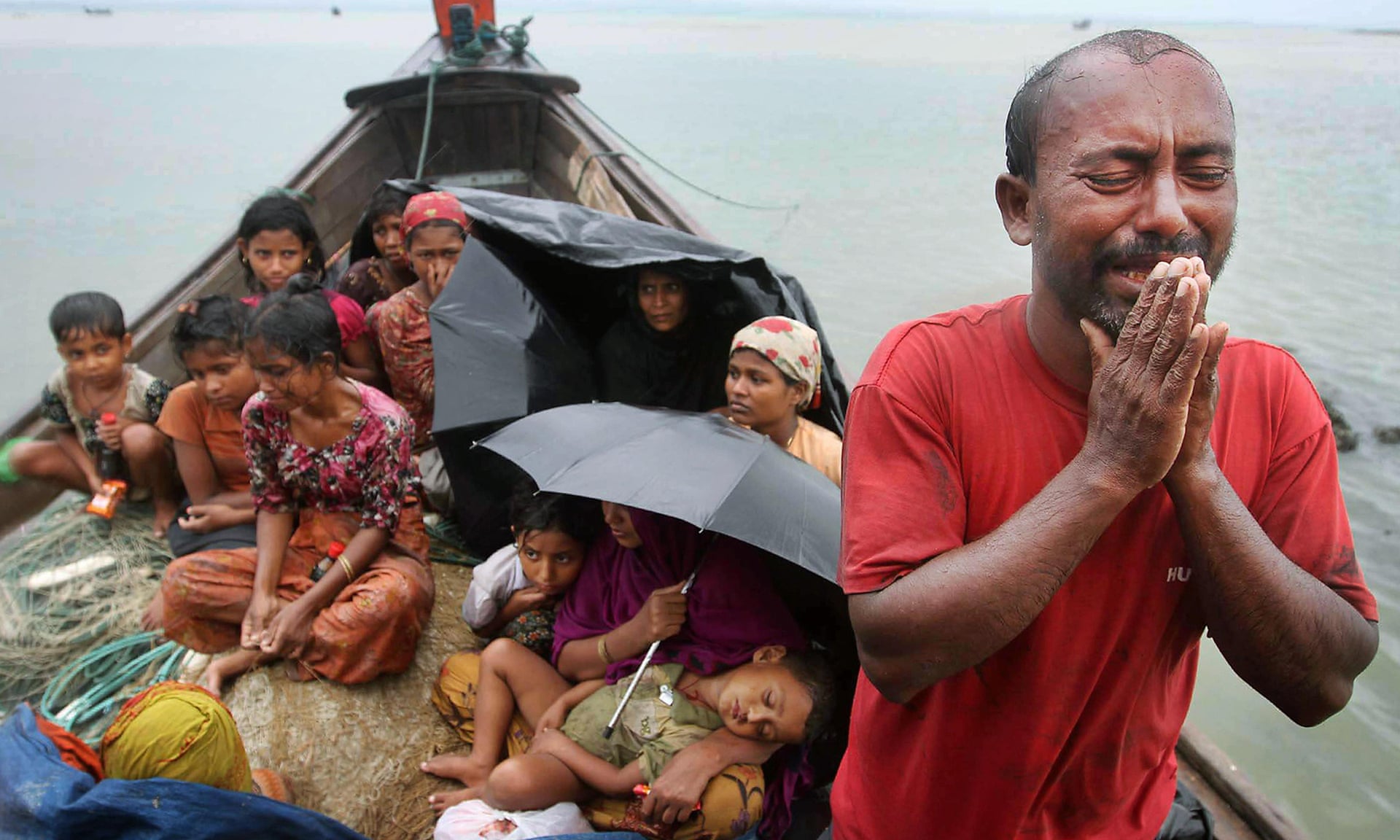Post by pieter on Sept 21, 2015 10:55:00 GMT -7
Genocide of the Rohingya people

A Rohingya Muslim man who fled from Burma to Bangladesh to escape religious violence, cries as he pleads after being intercepted by Bangladeshi border authorities in June 2012.
Photograph: Anurup Titu/AP
As of 2013, about 1.3 million Rohingyas live in Myanmar. They reside mainly in the northern Rakhine townships, where they form 80–98% of the population. International media and human rights organizations have often described Rohingyas as one of, if not the, most persecuted minorities in the world.
Myanmar has a Buddhist majority. The Muslim minority in Myanmar mostly consists of the Rohingya people and the descendants of Muslim immigrants from India (including what is now Bangladesh) and China (the ancestors of Chinese Muslims in Myanmar came from the Yunnan province), as well as descendants of earlier Arab settlers and the recognised Kamein minority. According to Human Rights Watch the Burmese government has denied citizenship to any Rohingya persons who cannot prove their ancestors settled in the country before 1823, the beginning of British occupation of what is now Arakan State.
According to Amnesty International, the Muslim Rohingya people have continued to suffer from human rights violations under the Burmese junta since 1978, and many have fled to neighbouring Bangladesh as a result.
They have been denied Burmese citizenship since the Burmese nationality law was enacted. They are not allowed to travel without official permission and were previously required to sign a commitment not to have more than two children, though the law was not strictly enforced. They are subjected to routine forced labour, typically a Rohingya man will have to give up one day a week to work on military or government projects, and one night for sentry duty. The Rohingya have also lost a lot of arable land, which has been confiscated by the military to give to Buddhist settlers from elsewhere in Burma.
Over the years thousands of Rohingya also have fled to Thailand. There are roughly 111,000 refugees housed in nine camps along the Thai-Myanmar border. There have been charges that groups of them have been shipped and towed out to open sea from Thailand, and left there. In February 2009, there was evidence of the Thai army towing a boatload of 190 Rohingya refugees out to sea. A group of refugees rescued by Indonesian authorities also in February 2009 told harrowing stories of being captured and beaten by the Thai military, and then abandoned at open sea. By the end of February, there were reports that of a group of five boats were towed out to open sea, of which four boats sank in a storm, and one washed up on the shore. February 12, 2009 Thailand's prime minister Abhisit Vejjajiva said there were "some instances" in which Rohingya people were pushed out to sea.

A Rohingya Muslim man who fled from Burma to Bangladesh to escape religious violence, cries as he pleads after being intercepted by Bangladeshi border authorities in June 2012.
Photograph: Anurup Titu/AP
As of 2013, about 1.3 million Rohingyas live in Myanmar. They reside mainly in the northern Rakhine townships, where they form 80–98% of the population. International media and human rights organizations have often described Rohingyas as one of, if not the, most persecuted minorities in the world.
Myanmar has a Buddhist majority. The Muslim minority in Myanmar mostly consists of the Rohingya people and the descendants of Muslim immigrants from India (including what is now Bangladesh) and China (the ancestors of Chinese Muslims in Myanmar came from the Yunnan province), as well as descendants of earlier Arab settlers and the recognised Kamein minority. According to Human Rights Watch the Burmese government has denied citizenship to any Rohingya persons who cannot prove their ancestors settled in the country before 1823, the beginning of British occupation of what is now Arakan State.
According to Amnesty International, the Muslim Rohingya people have continued to suffer from human rights violations under the Burmese junta since 1978, and many have fled to neighbouring Bangladesh as a result.
They have been denied Burmese citizenship since the Burmese nationality law was enacted. They are not allowed to travel without official permission and were previously required to sign a commitment not to have more than two children, though the law was not strictly enforced. They are subjected to routine forced labour, typically a Rohingya man will have to give up one day a week to work on military or government projects, and one night for sentry duty. The Rohingya have also lost a lot of arable land, which has been confiscated by the military to give to Buddhist settlers from elsewhere in Burma.
Over the years thousands of Rohingya also have fled to Thailand. There are roughly 111,000 refugees housed in nine camps along the Thai-Myanmar border. There have been charges that groups of them have been shipped and towed out to open sea from Thailand, and left there. In February 2009, there was evidence of the Thai army towing a boatload of 190 Rohingya refugees out to sea. A group of refugees rescued by Indonesian authorities also in February 2009 told harrowing stories of being captured and beaten by the Thai military, and then abandoned at open sea. By the end of February, there were reports that of a group of five boats were towed out to open sea, of which four boats sank in a storm, and one washed up on the shore. February 12, 2009 Thailand's prime minister Abhisit Vejjajiva said there were "some instances" in which Rohingya people were pushed out to sea.


